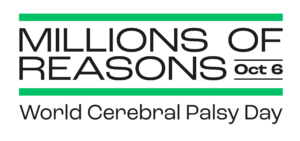Turkey Jumps High for Cerebral Palsy
How tongue twisters and jumping sent cerebral palsy awareness viral across Turkey. When celebrities choose to get involved with a public awareness campaign, you know that your cause is gaining traction.
A social media challenge to raise awareness
An innovative social media campaign run by The Spastic Children’s Foundation of Turkey –Türkiye Spastik Çocuklar Vakfı – set out to draw attention to the cause of individuals with cerebral palsy. With the assistance of local celebrities, the results were phenomenal.
The campaign was simple. But simple is often best.
It was about asking people to lay down a social media challenge for their friends, spreading the word about what it really means to live with cerebral palsy at the same time.
It reached more than 10-million people in one month.
“The majority of Turkish society is unfamiliar with cerebral palsy. And those who know about it mix it up with mental disorders,” says Nigar Evgin, General Director at The Spastic Children’s Foundation of Turkey (The Foundation).
“It is well-known that once every 8 hours a Turkish baby with cerebral palsy is born. In other words, 4 out of 1000 Turkish babies have cerebral palsy.
“In view of this widespread form of handicap, the low public awareness of cerebral palsy is both thought-provoking and deplorable,” she says.
The campaign comprised 4 phases
Every participant was asked to:
- Photograph or record themselves while saying a tongue twister or jumping, and then post it on Twitter, Facebook or Instagram
- Use the text defined for the campaign as their post message
- Invite 3 of their friends to participate in the campaign
- Claim monetary donations from friends who rejected joining the campaign, through a text message.
“The campaign spread wide and fast enough to urge Turkey’s popular names in arts, sports and media to share posts about it,” says Nigar.
“The initial campaign group was comprised of family members or friends of kids with cerebral palsy but the light they sparked turned into a huge flame in a short time. “Our awareness activities utilise various methods and tools but are always focused on amusing and quickly informing the public,” she says.
Exactly how do tongue twisters and jumping send a campaign viral?
Nigar explains that The Foundation spent a long time discussing the campaign with their digital agency before realising that the fastest track to raising public awareness for cerebral palsy would come from people experiencing the condition’s difficulties for themselves.
“For this particular campaign, we selected two activities that are difficult for people with cerebral palsy,” she says.
“One of these activities is speech, the other being jumping. However easy these activities are for many people, individuals with cerebral palsy primarily focus on these things.
“I think the first biggest motivation for people to get involved with this campaign came from the many celebrities that supported it with personal involvement. It really spurred regular people into action,” says Nigar.
“The second motivation is having a good feeling about contributing to the social good.”
And on that, how do you get celebrities involved in a public awareness campaign?
The campaign attracted 35 celebrities across Turkey’s arts, sports and media scenes throughout 2016.
“Firstly, we drew up a list of celebrities who use social media intensively, and who enjoy a high number of followers,” says Nigar.
“Certainly, getting in touch with the celebrities was a demanding job. However, certain celebrities were willing to support our awareness campaign.
“Three celebrities in particular were the reason our campaign was able to hit the ground running. It was because of them, we were able to get in touch with other celebrities,” she says.
During the initial rollout, The Foundation maintained extensive communication with other agencies, national TV channels, and newspapers who gave considerable coverage to the campaign.
What does all this really mean for people living with cerebral palsy and their families?
Nigar tells us matter-of-factly that Turkish families don’t feel comfortable speaking about cerebral palsy in social environments.
“Moreover, when a child with cerebral palsy goes to school, they will have difficulties gaining recognition in class,” she says.
“This social media campaign has definitely furthered social awareness of cerebral palsy, with more and more success stories turning up in the media.”
Nigar says the campaign helped The Foundation to show Turkish society that people with cerebral palsy have to overcome physical difficulties for social inclusion.
“Our campaign has drawn attention to the core problem of cerebral palsy which lies in the physical disability,” she says.
Watch the campaign video case study and view some of the campaign posts.


